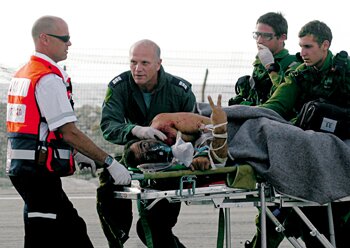| Tomer Bouhadana - victory of conscience |

|

|
|
This is to show them all – that our spirit is intact. It did not break. It never will. This is my story, a soldier’s story and our story as a people of strength, pride and the courage to overcome. On Friday, July 21 2006, the commander called me. Something told me that I was going towards a peak in my life, even though the nature of it was unknown yet.
I was to lead a unit of my men in Lebanon, nicknamed “Buohadana Force”, in critical fighting areas, and serve as a rescue to Brigade units in case of unforeseen difficulties. Personally, although well trained, this was the first time I saw the IDF mobilised and prepare to fight a war. I got to headquarters and got my orders. We were to join the Nimrod Battalion at the outskirts of the village Raba-a-Taltin. We traveled slowly because of the D-9 tractors, arriving at the target with the first rays of the sun, while the Nimrod unit was engaged in fire with a Hezbolah force situated in the Kasba, the top of the village, overlooking the entire area. Our force was headed by the tanks, next came the armored vehicles carrying the soldiers who sat closed in at the bottom of the vehicles and the D-9 at the end. Most soldiers, other than the drivers and those on watch duty were joking within, detached from the outside fight. An anti-tank missile exploded on the way, missing one of our vehicles by half a meter. This was a real war. In the next few days we went into Lebanon and back a few times, each time with specific orders. The Battalion Commander gave us the next mission: taking over Markabe. The village of Markabe is situated on a narrow hill running from east to west. In the middle of the village runs a central road, while the houses are built on both sides, creating a long and narrow corridor. The Brigade was to take over the village and open this narrow corridor as an alternative road for the Division fighting in the village of Taibe. My company was to clear all houses to the south of the main road, beginning in the local school, all the way to the Kasaba.At two in the morning the busses came for us. There was a lot of tension in the air. On way to the border we passed by a canon battery shooting towards the village of Merkabe, putting the whole area alight with fire. The night was full of terrible sounds of blasts and hellish lights. Helicopters stood above us, shooting suspicious buildings. At 5 am at sight of the first rays of light, the Patrol Battalion was the first to engage in fighting. The tanks had their turn at shooting, taking over the first houses in the village. We advanced quite slowly, in order to clear every suspicious building. At 10 a.m. we arrived at the school building. The commanders of all units held a brief meeting, passing the lead of fighting from the Patrol Battalion to my Battalion. I called my under-commanders, took a minute to observe the area allotted to us and I gave the last orders. Tanks joined forces with us and we began fighting. We first shot at targets that looked suspicious, with the aid of the tank. Using my binoculars I noticed that thirteen hundred meters ahead of us, there was a large balcony overlooking the road. It looked very dangerous, very suspicious. I asked the tankers to shoot it with heavy fire, but it was too late, as some of our soldiers were already on the road and could have been hurt. We made do with machine-gun fire. We started to move on slowly, avoiding the paved road which was open to the enemy and east to target. We moved from one backyard to the next, often through walls which were blown apart or hit down. We moved forward from one building to the next, sheltering each other. Before entering a house we shot a LAO missile, threw hand-grenades, blew-up the door, walked in while shooting. As we went on, we got a message that there are some Hizbullah soldiers sending telephone messages from the Kasba area, our final target. At about 4 p.m. we arrived at a building surrounded by a very thick and high concrete wall, which we had no way of breaking through. We had to go in through the main entrance on the road. There was no way to surround the building, because it stood on a hill and had tactic importance. I noticed that the path leading to the locked gate of the house went through a kind of corridor, with walls on both sides of the main road. I issued a new order. The Platoon of Neri was to join me in an attempt to take-over the building. The Platoon of Idan was to give us cover. The tank shot the upper floor of the building. We fired two missiles into it and threw some grenades above the wall. I went forward first and Neri followed carrying explosives to open the gate. The rest of the platoon stayed behind, well arranged in two lines, ready to follow. I walked on into the alley, Neri still behind me, and Itzik, an Ethiopian soldier stationed at the corner of the alley. Twenty meters into the alley, I saw that under that large balcony stood a black clean car, spick and span, with not a bullet hole in it, a very unusual sight. Neri called out, “they are shooting us!” I noticed someone moving on the balcony, shooting over our heads into the wall next to us. There was no place to find shelter, only tall walls on both sides. I called out, “back to the corner!” We turned back. All of a sudden there was terrible shooting and a big bomb. I felt a huge hit on the left side of my back, a strong pain, as if an electric shock pierced my body. My face was covered with blood. I could not move my left arm. I fell, but got up and ran to the corner, towards the waiting unit. The soldiers opened fire at the alley. The medic ran towards me, trying to treat my wound. I whispered to Ofir, one of the medics, my next orders, “they were shooting from building number 68. Get the tall building. Get the tank to advance. Use LAO missiles. Don’t over-use ammunition.” Ofir called out my orders. Zahi, my second- in-command approached to be briefed by Ofir. It was hard to breath. The pain felt terrible as if there was a heavy concrete block sitting on my chest. I had a hole at the base of my neck. The medic summoned Itzik and told him to push his finger into the main artery, cut in my neck. Neri too had been hit by RPG shrapnel that first hit the wall. He was soon located and taken care of by the medics. The battle of my company went on under Zahi’s command, with the help of the company on the north side of the road. In that battle ten Hezbolah soldiers were killed. Neri and I were put on stretchers and carried back through the holes we previously made in the walls, all the way to the school building, where some doctors were at work. All along that road, Itzik kept pushing his finger into my neck. We were shot at by a sniper. The soldiers had to stop running and get down almost dropping us off the stretchers in order to shoot the sniper with a missile. We got the doctors’ unit. I was conscious all that time, knowing very clearly that I should not surrender to the need to close my eyes and drift away, to sleep, to forget it all. The doctors decided to perform an operation right there as they diagnosed the air pressure in my chest. Without anesthesia they inserted a trocker to drain the accumulated blood. Twenty minutes later a few armored cars came. They drove fast, making every part of my body shrink with pain. We get to the Israeli border and I am flown to Rambam hospital in Haifa. As the helicopter starts to land, I am freezing and I know exactly what it means. I breathe with difficulty. Touch down. The door opens and I see the lens of a camera pointed at me. Our battle against Hezbolah is a fight over consciousness, not over territory or a hill in south Lebanon. Victory is a matter of consciousness. I make the sign V with my fingers. Tomer Bouhadana, age 32, served in the IDF from August 1994 through August 2001. In 2004, he took on the rank of Company Commander of the Northern Paratroopers Brigade as a reservist. |

















